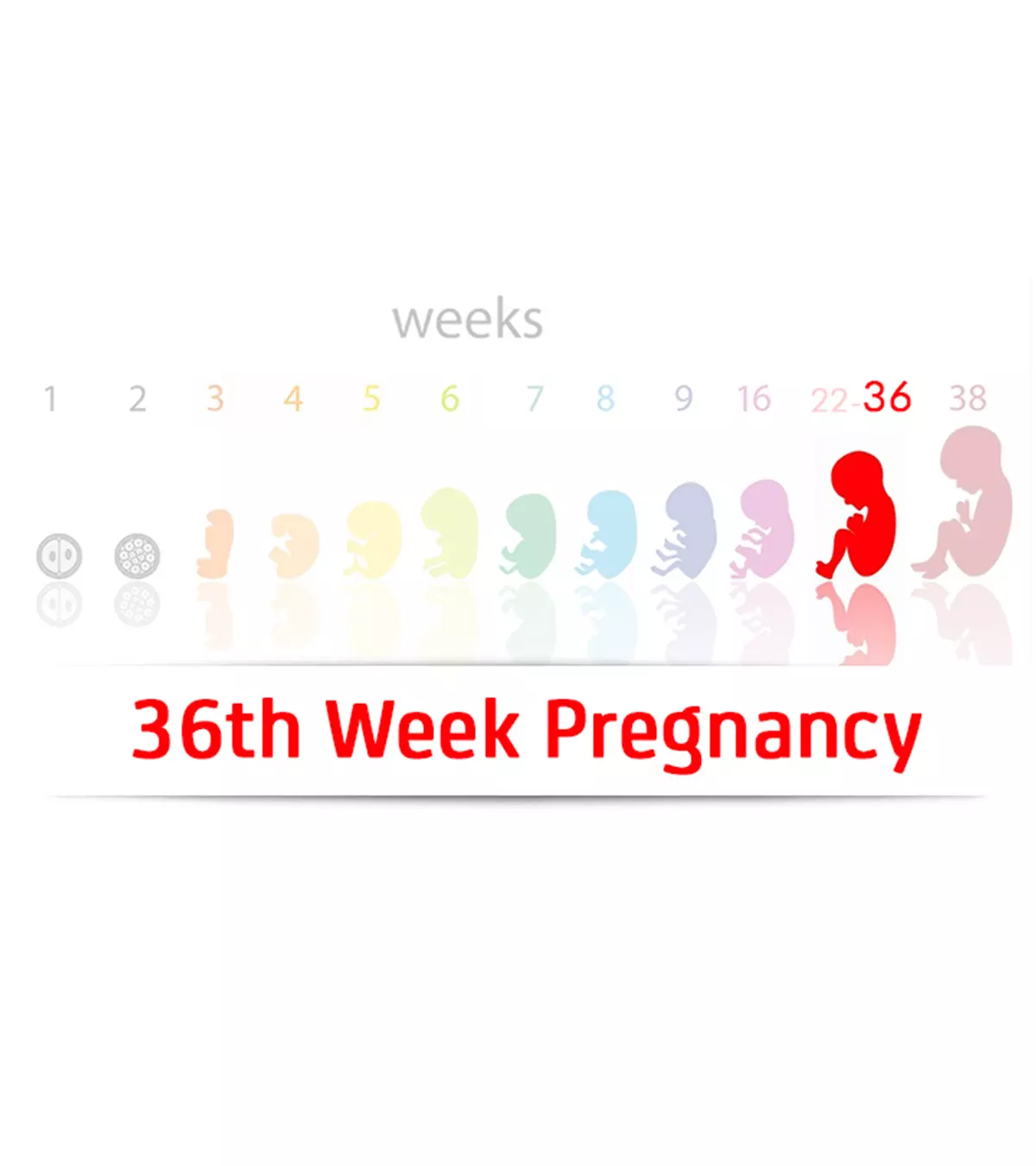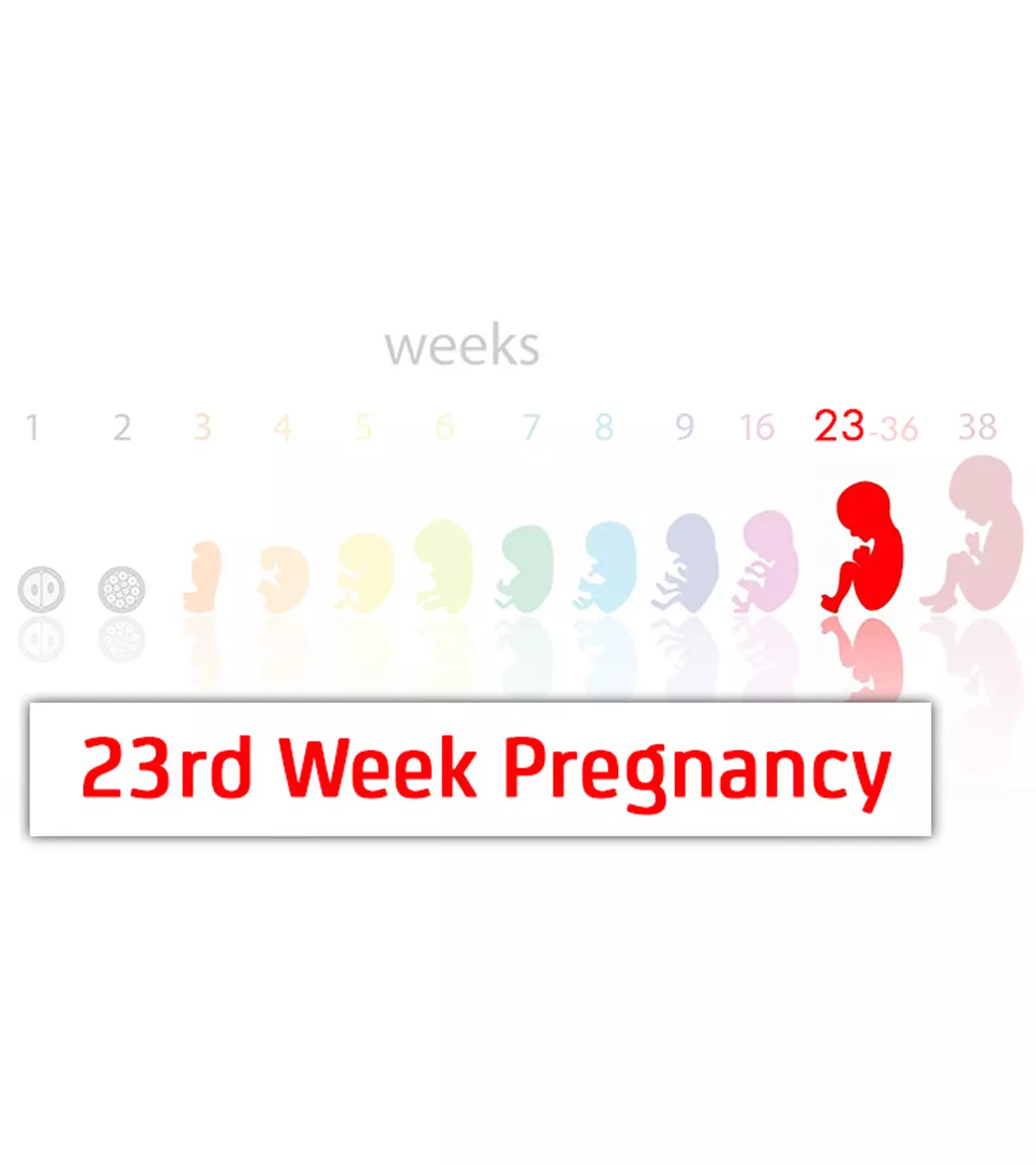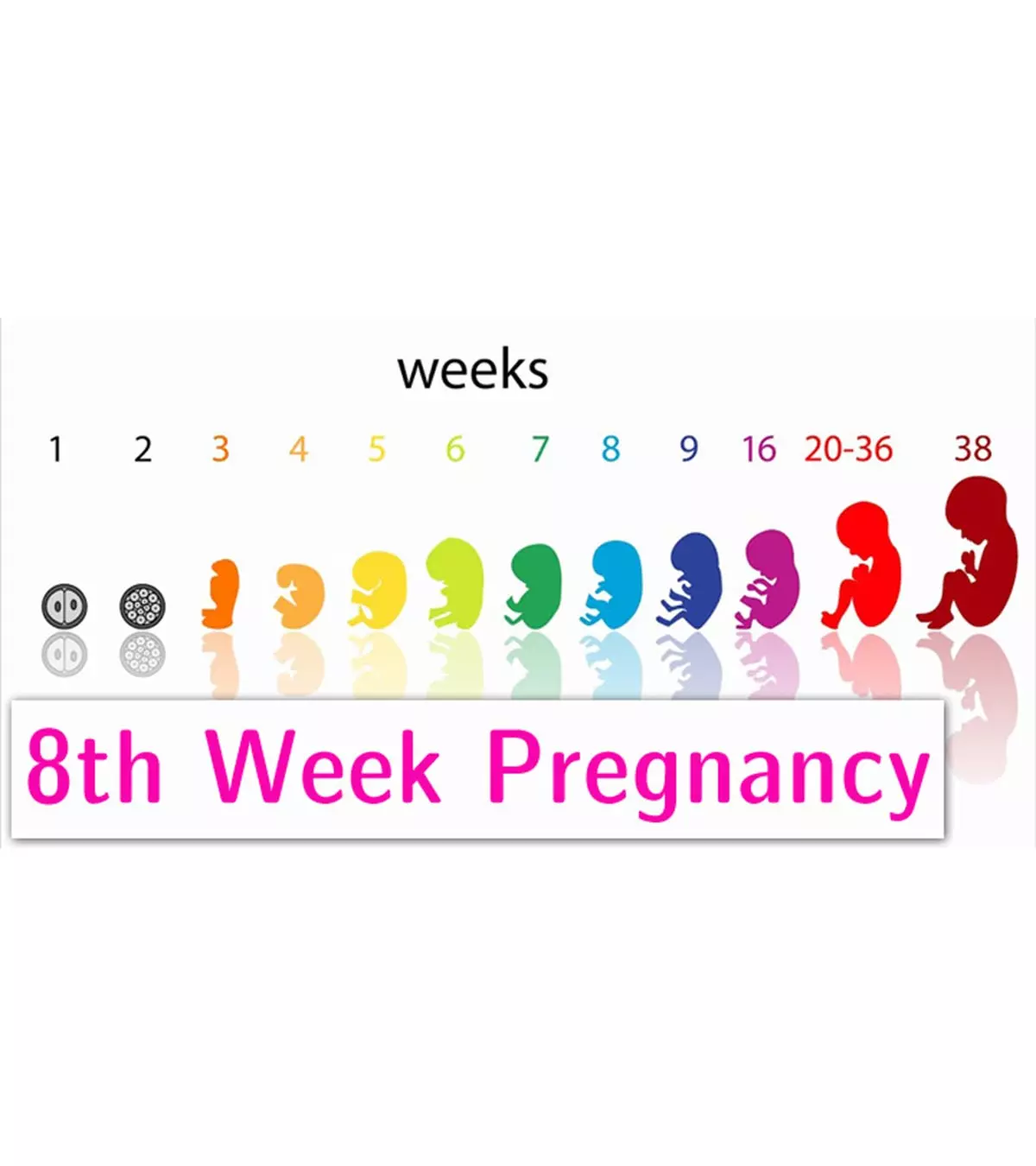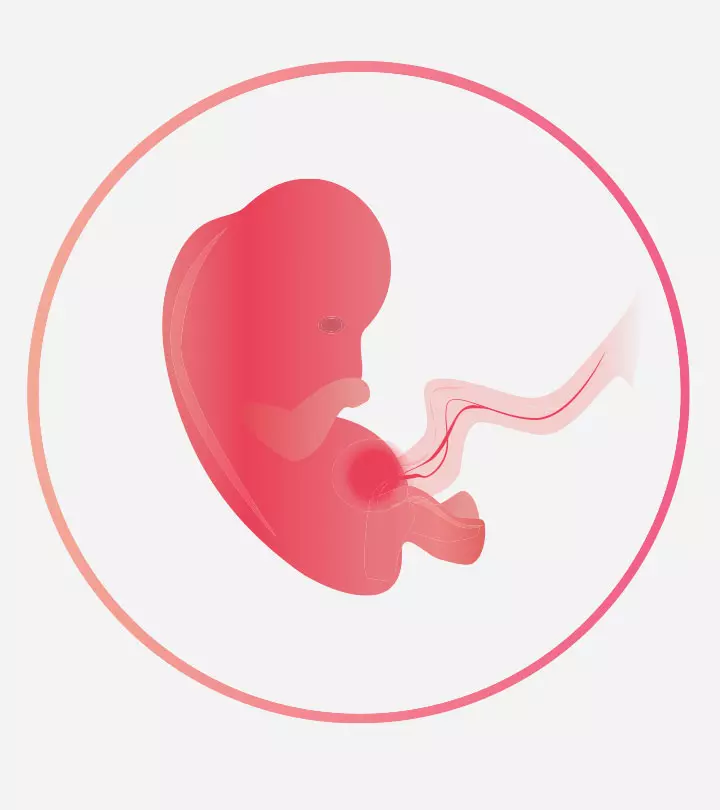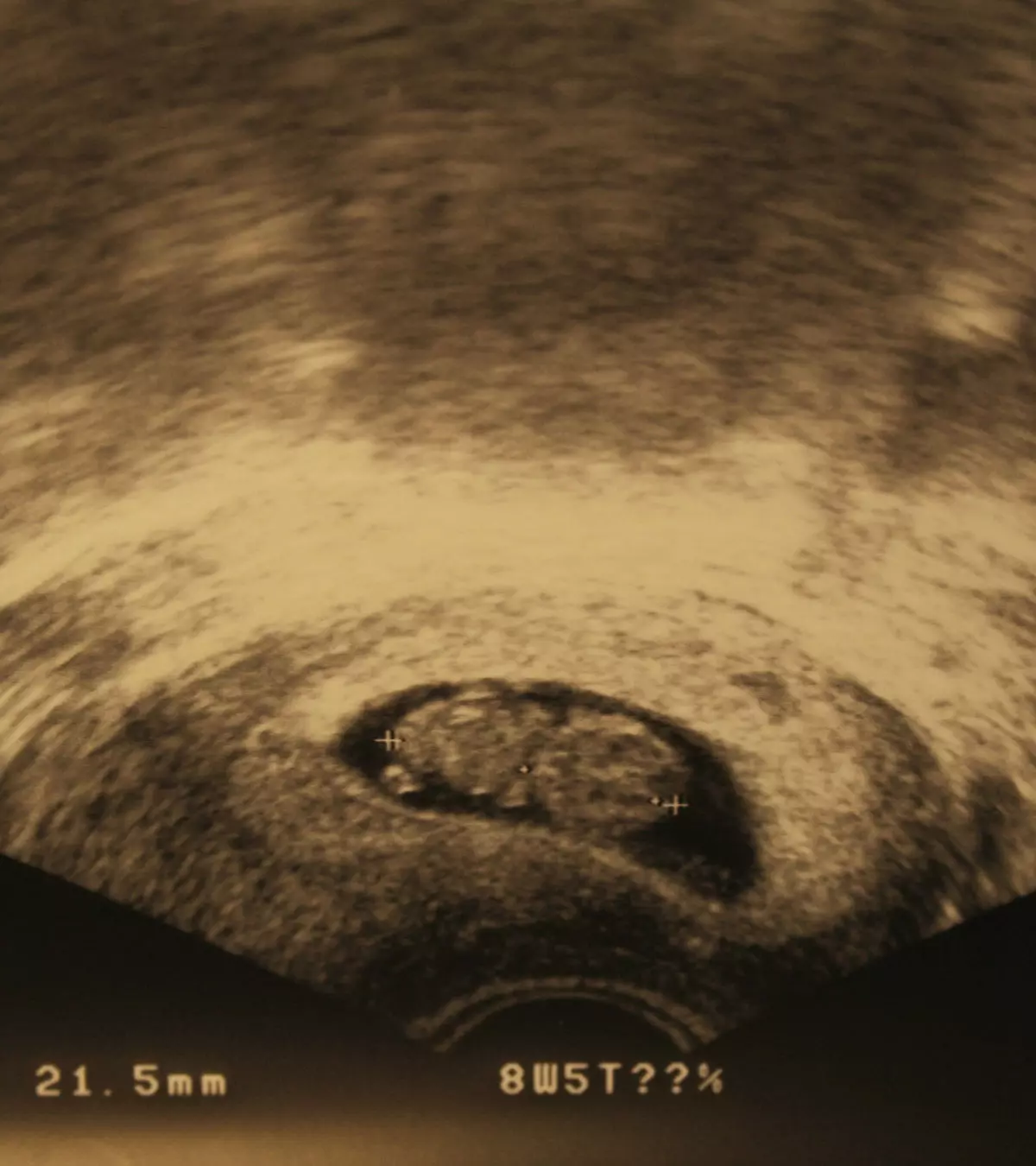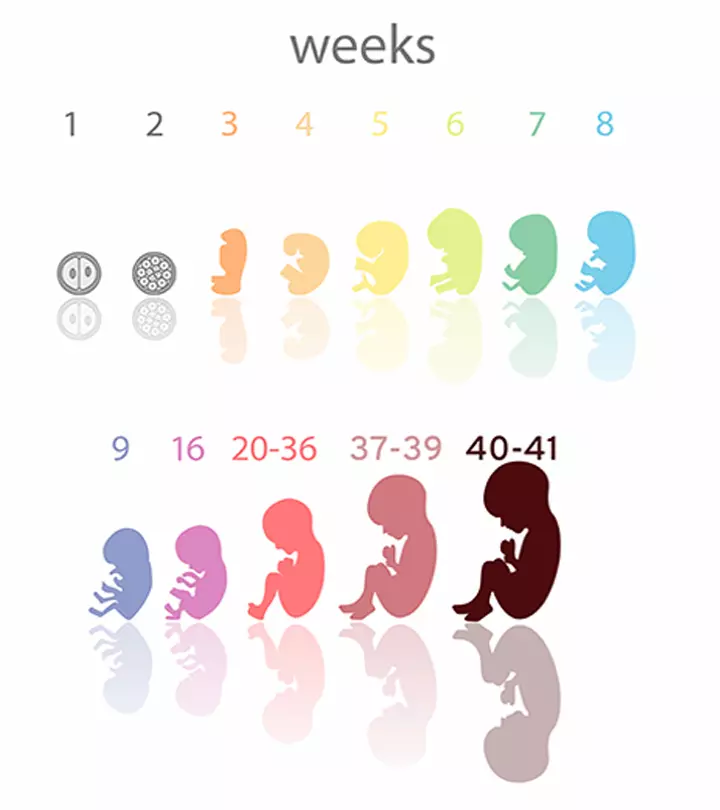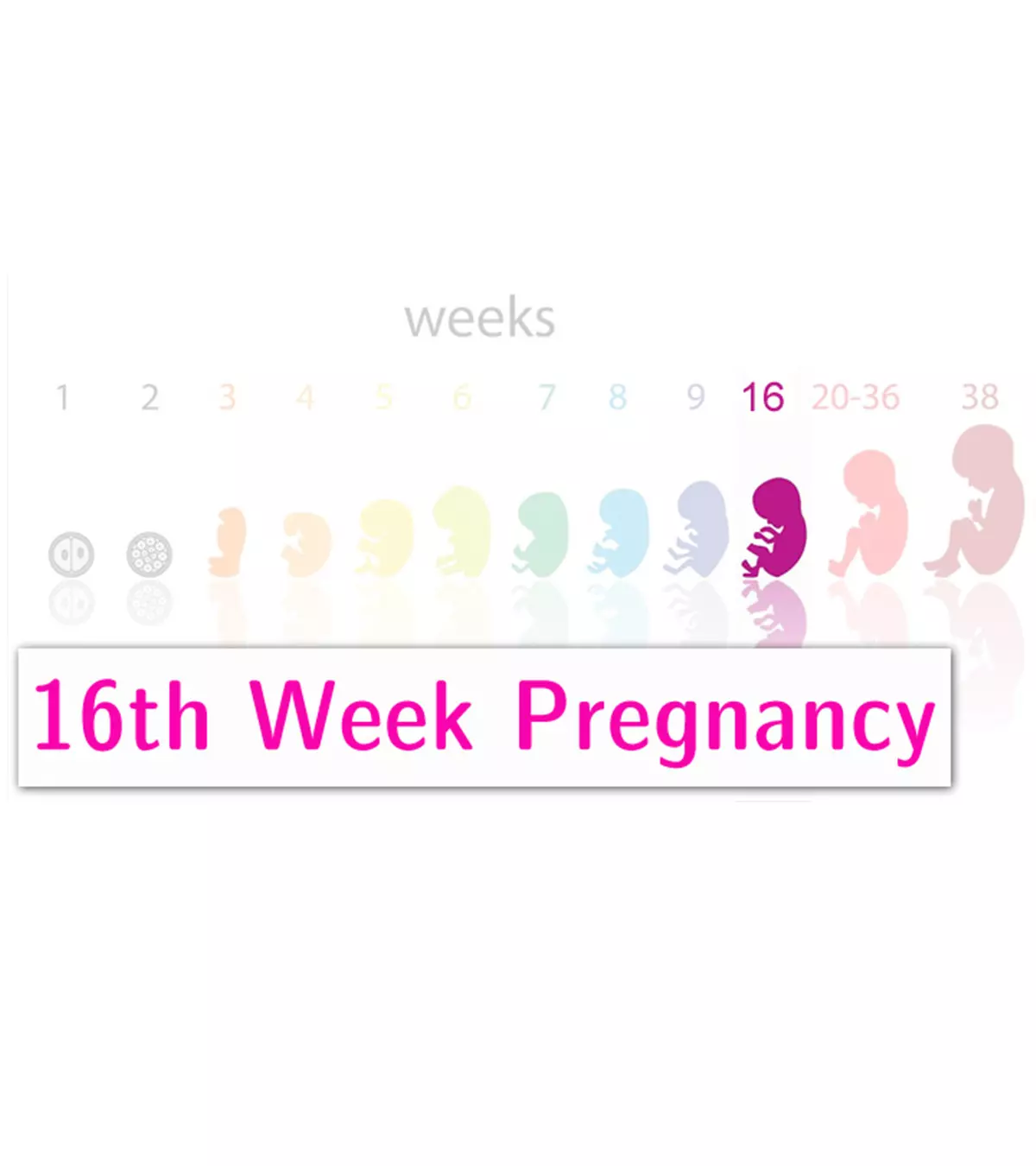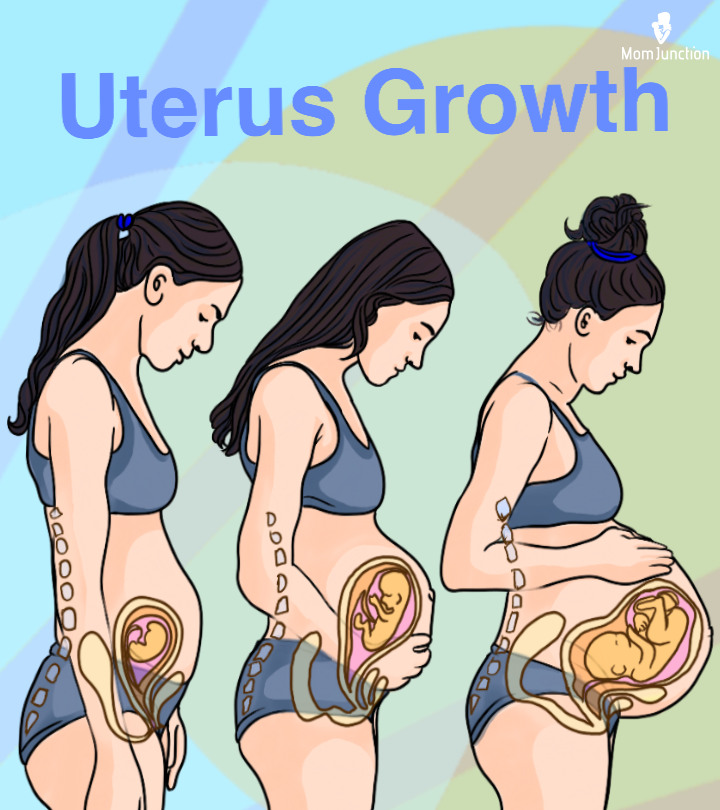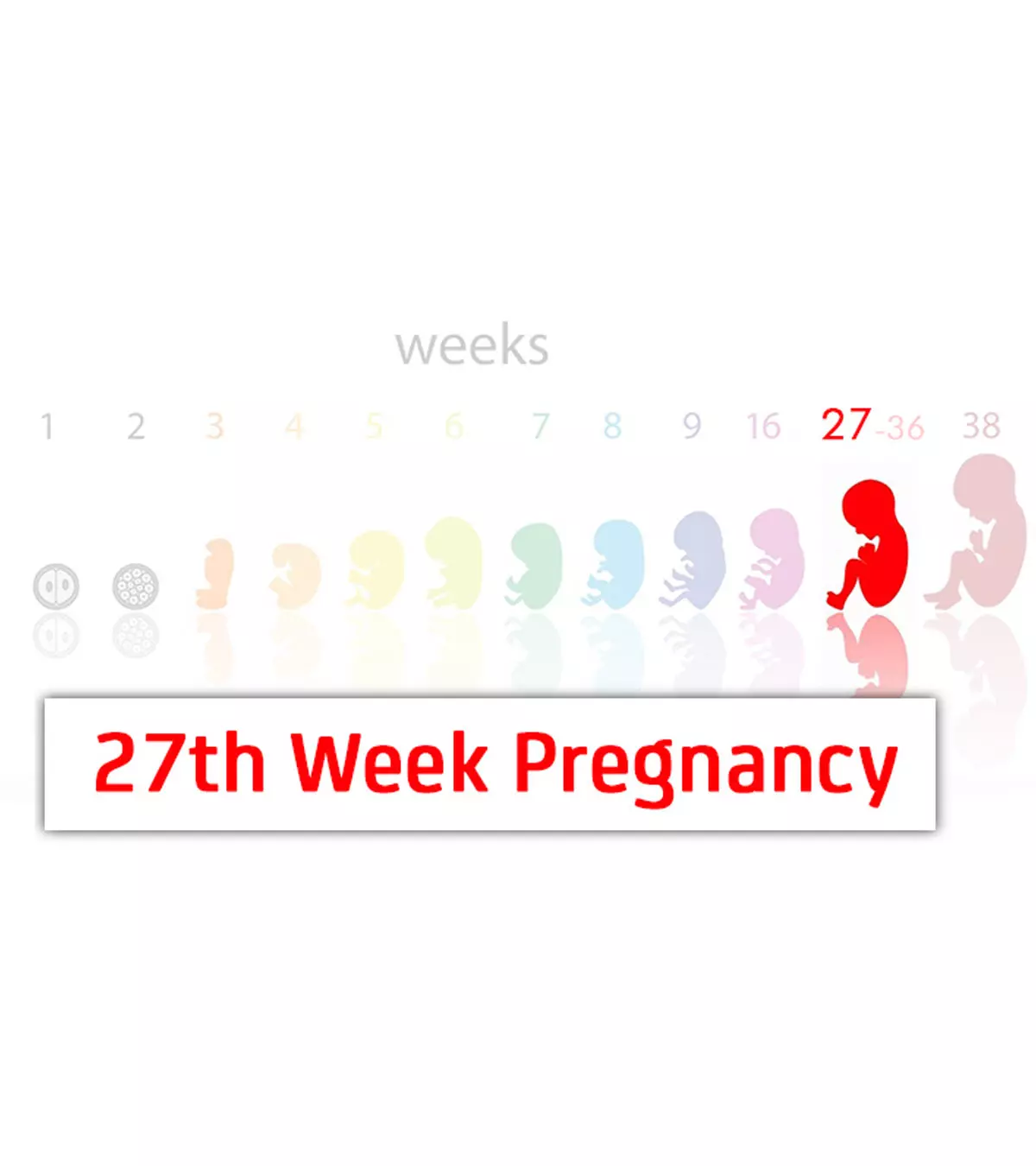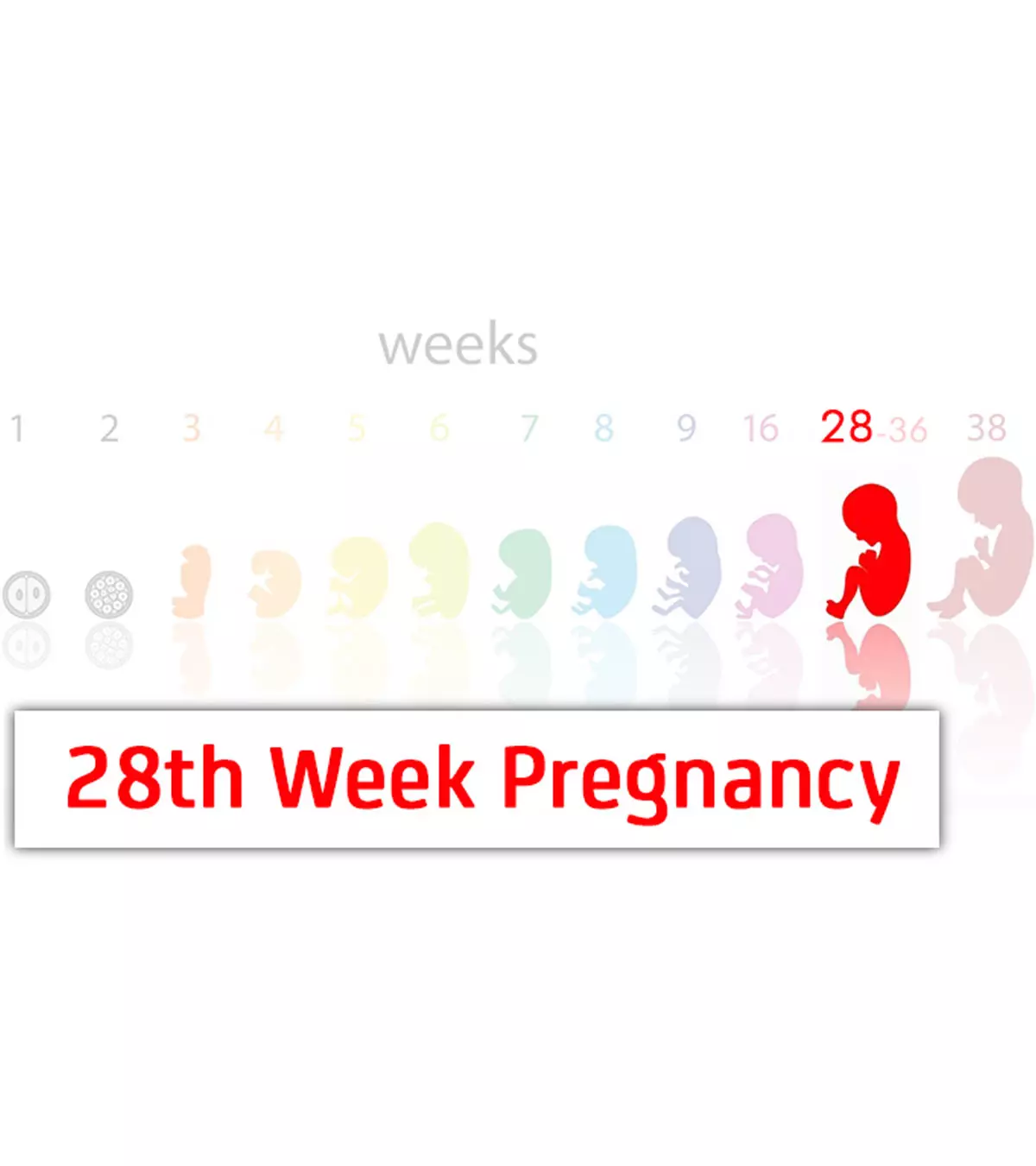
Image: Shutterstock

Key Pointers
- During the 17th week of pregnancy, fetal development is rapid.
- The baby weighs about 120g and begins light movements inside the uterus.
- At this stage in the second trimester, the mother may experience increased appetite, weight gain, indigestion, frequent urination, and lower back pain.
- It is important to follow up with a doctor for prenatal checkups and necessary scans at this stage.
- A well-balanced, healthy diet, light exercise, and plenty of fluids can help fight fatigue and manage other symptoms.
How Many Months Is 17 Weeks Pregnancy?
If you are 17 weeks pregnant, it means you are four months pregnant. Your belly looks more rounded now.
An ultrasound scan at this time is crucial for monitoring fetal development and identifying any issues. During this scan, the doctor can evaluate the baby’s growth, check the amount of amniotic fluid, and, if desired, reveal your baby’s gender. It’s also an opportunity for you to visualize your baby for the first time.
In this post, we tell you how a baby typically develops inside the womb during this week, the changes that are likely to happen in your body, and the care you need to take. Let’s begin with the size of the fetus.
How Big Is Your Baby?
The baby is about the size of a pomegranate weighing around 120g (5oz) and measuring 12cm (6.8in) in length from crown to rump
(1).
Baby Development At Week 17
Your baby’s body is now growing in proportionate to the size of the head.
| Body parts | Development stage |
|---|---|
| Skin | Wrinkled and coated with vernix. Vernix is a waxy coating that protects the baby’s skin inside the womb. |
| Lanugo | Fine hair develops on the skin |
| Nails | Grown till the tip of the fingers and toes |
| Mouth | Begins to open and close |
| Eyes | Eyelids are closed. Eyebrows and eyelashes are growing |
| Fingers | Unique fingerprints develop |
| Heart | It is developing and beats at the rate of 110-180 beats/minute |
| Circulatory system | Fully functional |
| Gallbladder | Starts producing bile, which is essential for digestion |
| Genitals | Developing. Female fetuses have eggs formed in their ovaries |
| Skeleton | Slowly transforming from soft cartilages to bones |
| Umbilical cord | Growing stronger and thicker |
| Spinal cord | It is getting covered by a fatty substance called myelin. Myelin protects and insulates the baby’s nerves and helps transfer the messages from the brain to other body parts through nerves |
| Placenta | It is as big as the baby, providing oxygen and essential nutrients |
| Kidneys (3) | Start passing urine every 50 minutes. The baby swallows urine present in the amniotic fluid |
| Taste buds | Developing; the baby can differentiate between bitter and sweet tastes |
| Intestines | Start making meconium (the first feces of a newborn) |
| Reflex | Sucking reflex is developed. Baby starts sucking the thumb |
In this week, feeling the wriggles of your baby is a whole new experience. So, how is your baby moving inside you?
Fetal Movement At 17 Weeks Pregnancy
You can feel slight movements of your baby inside the womb. This light feeling of movement is called ‘quickening’.
Women who are expecting for the first time may not recognize the movements and mistake them for gas rumblings. Second-time pregnant women can recognize these early movements of the fetus.
In addition to the fetal movements, there are several other pregnancy symptoms you might experience during this week.
 Quick fact
Quick factWhat Are The Symptoms Of 17th Week Pregnancy?
Here are some of the symptoms you may have during the 17th week:
- Increase in appetite: You might feel hungry often as the fetus development process demands more nourishment for a healthy growth.
- Weight gain: At 17 weeks, your weight gain will be around 1-5lb (500g to 2kg). The weight increases by 1lb (500g) every week after the first trimester.
- Skin pigmentation: Some women may develop brown or black spots on the neck and face, known as melasma (the mask of pregnancy). The hormonal changes are one factor for causing the spots.
Tip: Protect your skin from the sun rays by applying sunscreens because exposure to the UV rays can worsen the condition. The skin conditions usually disappear post delivery.
- Linea nigra: The dark line running from the center of the belly to the pubic line starts to show. It is skin pigmentation near the abdomen where the muscles are stretched and usually wanes after the delivery.
Sciatic nerve pain: The sporadic pain starts in the lower back and radiates to the legs through the sciatic nerve, which is the largest nerve in the body. The pain is generally centralized in one of the legs and is caused due to the pressure exerted on the nerve by the growing baby.
Tip: Sleeping sideways and keeping pillows between the knees and ankles will help relieve the discomfort to some extent. Swimming, yoga, mild exercises, and massage can help relieve the pain to some extent.
- Vaginal discharge: A milky or clear, odorless vaginal discharge, also referred to as leucorrhoea, is common at this point. This discharge helps prevent any infection-causing bacteria from passing through the vagina to the uterus.
- Frequent urination: The hormonal changes and the pressure exerted by the growing uterus on the bladder can increase the urge to pee often.
- Carpal tunnel syndrome: The syndrome is characterized by pain and numbness in the fingers, swelling, and inflammation. Studies have found that increased gestational weight and obesity contribute to this syndrome during pregnancy (3).
- Oral problems: The hormonal changes can affect the ligaments and the bones in the mouth. Pregnancy tumors — swelling between the teeth due to excess plaque — are common during the second trimester. Tooth decay could be another problem arising due to the increase in mouth acids if morning sickness is persistent (4). Bleeding gums may occur as gums become more sensitive and delicate during pregnancy. Following proper dental care during pregnancy can help prevent the issues and promote maternal health.

- Heartburn/ indigestion: Due to the release of the relaxin hormone, the muscles in the digestive tract relax, pushing the gastric acids up towards the esophagus, causing heartburn. Also, the stomach, being pushed by the growing uterus, affects the bowel movements causing indigestion.
- Food cravings: Eight out of ten expectant women are said to experience cravings.
- Nasal congestion: Hormonal changes can soften and swell the nasal membranes, leading to a blocked nose. Try not to blow it hard as it can also cause nosebleeds.
 Point to consider
Point to consider- Headaches: They can be the result of stress, fatigue, nasal congestion, or allergies.
- Dizziness: This occurs due to hormonal changes and an alteration in the blood flow. With more blood flowing towards the fetus, there is a minor reduction in the blood flowing to your brain, which decreases the blood pressure and causes dizziness. A drop in the blood sugar level can also cause dizziness during pregnancy.
- Backaches: The growing belly puts pressure on the muscles of the lower back, causing back pain. In order to support the extra weight, the lower back curves more than usual, causing stiffness and soreness.
- Hot flashes: With more blood produced in the body to support the growing baby, you might have hot flashes as the body temperature rises by a few degrees.
- Varicose veins: The growing uterus puts pressure on the veins that carry blood from your legs to the heart and reduces the backflow of blood. This causes blood to pool in the veins, leading to varicose veins.
All the above-mentioned symptoms are a result of the changes happening in the hormones and the uterus. There are other changes happening as well.
Things To Do This Week
Here are some important tips for a healthy 17th-week pregnancy:
- Drink plenty of water to keep yourself dehydrated.
- Follow a diet rich in fruits and vegetables like apples, avocado, seafood, mushrooms, leafy green vegetables, soybeans.
- Avoid jerky and brisk movements.
- Switch to flat shoes.
- Have regular, small meals for better digestion.
- Do not take any over-the-counter medicine without discussing with your doctor.
- Take rest.
- Engage in light workouts to keep yourself active and healthy.
- Wear loose-fitting and comfortable clothes.
- Avoid spicy and fatty food and caffeinated drinks.
- Join a prenatal class to connect with other expectant parents and gain valuable insights.
Bodily Changes In The 17th Week
Physical changes

- Your pregnancy belly is noticeable by now because the baby is growing in size.
 Health fact
Health fact- The breast size increases with the areola getting darker. As there is more supply of blood to the breasts, the blue and green veins become prominent around the breast area.
- As the skin stretches with the growing belly, you may feel a mild itching sensation on your belly, which is normal. But if the itching is severe and felt on the abdomen, palms, and in the soles of feet, then it could indicate obstetric cholestasis (OC), a liver condition occurring during pregnancy. Though there is no cure for this, it abates a few weeks after delivery (5).
- Stretch marks begin to appear as your skin gets stretched with the growing belly.
- Your hair volume might increase and look healthy due to the hormonal changes, especially the estrogens (6).
- The nails might become brittle and soft, and grow quickly during the second trimester, again due to the hormonal changes.
Gingy Pants, a mom of three and a registered nurse, shares her experience of the 17th week of pregnancy on her YouTube channel. She says, “Physically, I am feeling great. I am seriously in this place where I’m like, am I even pregnant because I have no symptoms and I just feel normal. I don’t really have like a belly bump, and emotionally, I’m a little Jekyll-and-hyde this week like one extreme to the other (ⅰ).’’
Emotional changes:
- You might start getting weird dreams, which could be a result of your anticipation and pregnancy fears.
- The thought of coping with pregnancy health issues and responsibilities of parenthood can make you feel stressed out and anxious.
Not just anxiety, you are also filled with excitement in the 17th week, as you are going to hear the fetal heartbeat through an ultrasound.
Tests Done At 17 Weeks Pregnancy
1. Ultrasound scan
In addition to hearing the fetal heart rate, you can also know the gender of the baby, its development, and the quantity of amniotic fluid, through an ultrasound scan.
In the case of twin pregnancy, an ultrasound scan can check for IUGR (intrauterine growth restriction). It is necessary to check if any of the babies are lagging in growth.
A level 1 ultrasound scan is done to check for any birth defects. The doctor will schedule a level 2 scan between 18 and 22 weeks.
2. Physical examination
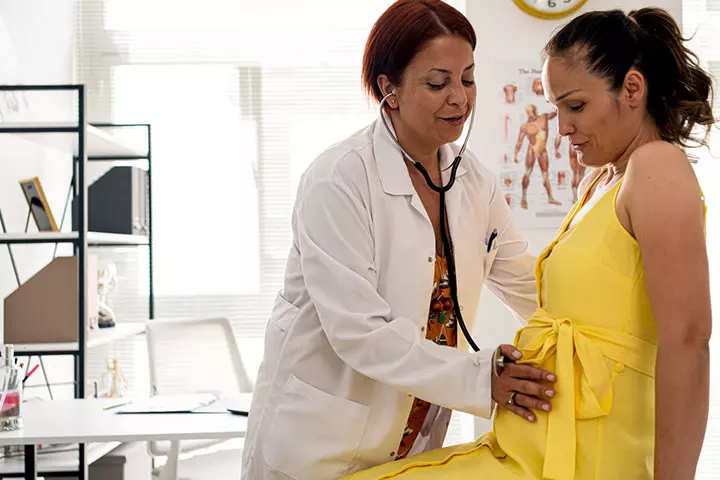
During your prenatal visit in the 17th week, the doctor will check your:
- blood pressure and weight
- measure the size of your uterus
- check for any pregnancy discomforts
3. Blood tests
A blood test is suggested to determine birth defects such as Down syndrome, Trisomy 18, and spina bifida (a neural defect) in the baby. Also, the blood glucose level will be evaluated to check for gestational diabetes.
Three blood tests are usually done to screen genetic abnormalities (7). However, these tests should only be done on the recommendation of your healthcare provider.
i. The serum integrated screen is first done between 10 and 13 weeks and again between 15 and 20 weeks of pregnancy. This helps in identifying the birth defects in the baby. In the case of twin pregnancy, the blood test does not detect Trisomy 18 but detects Down syndrome, neural tube defects, and abdominal wall defects.
ii. The sequential integrated screen is similar to serum integrated screening, wherein this blood test is analyzed along with the results of nuchal translucency (done between 11 and 14 weeks) to determine birth defects. In the case of twin pregnancy, this test can detect Down syndrome, neural tube defects, Trisomy 18, and abdominal wall defects.
iii. The quad marker screen or triple test is done if the pregnant woman has started her prenatal care after the 14th week and did not undergo the sequential or serum screening tests. The test is usually done between 15 and 20 weeks. In twin pregnancies, it helps detect Down syndrome, neural tube defects, and abdominal wall defects but not Trisomy 18.
iv. Amniocentesis is another test carried out between the 15th and 20th week of pregnancy to detect certain genetic abnormalities. It is done by extracting a small sample of amniotic fluid and is an accurate way of diagnosing chromosomal abnormalities. It is done if (8):
- The triple test shows an abnormal result.
- you are above 35 years of age.
By the 17th week, your pregnancy condition stabilizes and you are likely to get relief from morning sickness symptoms such as nausea, and tiredness. In fact, the second trimester is the most relaxed period in your pregnancy. However, some women may feel mild contractions during this time. These are known as Braxton hicks contractions or false labor pains. So, continue to be alert and keep your doctor’s contact number handy.
When To Call The Doctor?
Call your obstetrician under the below circumstances:
- If you notice spotting or vaginal bleeding along with back pain or abdominal cramping
- Amniotic fluid leak, which is generally a pale yellow or clear discharge
- If there is a change in the intensity of the vaginal discharge with a foul smell
- Diarrhea that lasts for more than a day
- Severe morning sickness
- Unilateral swelling of leg or hand
- Severe body itching without any rashes, which could be an indication of obstetric cholestasis
- Extreme back pain
- Symptoms of urinary tract infection
- Having a persistent headache, dizziness, period-like contractions and heart palpitations
- Vision changes, which could be due to diabetes or preeclampsia
- Constipation with considerable abdominal pain
Nutrition In The 17th week
Here is the list for you:
| Nutrient | Goodness | Sources |
|---|---|---|
| Calcium | Supports the development of bones in the baby | Low-fat milk, cottage cheese, yogurt, tofu, broccoli and almonds |
| Folic acid (folate) | Prevents birth defects in the baby | Spinach, orange juice, collard greens, kale, asparagus, beans, fortified whole-grain cereals, wheat germ, whole-grain bread |
| Iron | Prevents anemia and maintains blood supply | Lean beef, eggs, soy, fortified whole-grain cereals, nuts, leafy greens, oatmeal are a good source of iron |
| Protein | Supports fetal tissue growth | Chicken, pork, lean beef, beans, turkey, dairy, tofu |
| Vitamin A | Helps in skin cell production and development of vision | Broccoli, strawberries, citrus fruits, bell pepper, mango, unpeeled potatoes, and tomatoes. |
| Vitamin C | Essential for the development of collagen in your baby’s body | Winter squash, carrots, sweet potatoes, leafy greens, mangoes, dairy, eggs, lean meat, fortified whole-grain cereals |
| Vitamin B12 | Required for cell development and synthesis of DNA, RNA, and protein in the baby | Milk, yogurt, and eggs |
| Zinc | Supports the baby’s cell development and DNA | Nuts, lean beef, legumes, whole grains, seeds, peas, fortified whole-grain breakfast cereals, spinach, and dairy |
Along with a healthy diet enriched with prenatal vitamins, be physically active by doing some pregnancy exercises or yoga. But before you begin exercising, take your doctor’s opinion, and do it under the supervision of an expert.
Pregnancy is an equal responsibility for both the partners. Hence, men also have a role to play.
Tips For Dad-To-Be

By this time, your partner might be going through various physical and mental changes. Here are some tips you can follow to support her:
- Be with her for the prenatal visits.
- Lend a helping hand in the daily household chores.
- Accompany her during walks or light exercises.
- Plan a day out and make her feel happy.
- Start finding the names for your child.
- Discuss your plans for your newborn.
- Go shopping for maternity clothes.
Frequently Asked Questions
1. Is it safe to have sex during the 17th week of pregnancy?
Having sexual intercourse during the 17th week of pregnancy is safe in low-risk pregnancies and if you do it softly without harming the baby. However, pregnant women, who are at risk of preterm labor or antepartum hemorrhage because of placenta previa must avoid indulging in sex (9).
2. Should I be worried if the baby doesn’t show any movement during the 17th week?
If you are pregnant for the first time, you may not be able to recognize the baby movements. Moreover, if the placenta gets anteriorly attached to the uterus, then the placenta cushions your baby and makes it harder for you to identify the movements. However, many women can identify fetal movements by the 22nd week of pregnancy.
3. What are the chances of having a miscarriage at 17 weeks pregnant?
At 17 weeks (second trimester) the risk of a miscarriage is about two to three percent , which is quite less compared to that in the first trimester (11).
4. Is it safe to travel while 17 weeks pregnant?
Yes, it is considered safe to travel in the second trimester (13 to 26 weeks) due to the low risk of pregnancy complications. However, consult your doctor if you have any pre-existing health issues that may make travel unsafe (12).
5. What can I do to prepare for the birth at 17 weeks pregnant?
Though 17 weeks is quite early to prepare for birth, you may start shopping for pregnancy bras and comfortable maternity wear (13).
6. What should I avoid during the 17th week of pregnancy?
Avoid activities that involve heavy lifting or high-impact exercises. You should also steer clear of unpasteurized foods and certain types of fish high in mercury.
Your baby is growing in length and becoming stronger. The baby can open and close the mouth and react to loud noises. Some women can feel fluttering around this time. However, if you have felt any movement yet, don’t worry, as it is the initial stage, and movements are slight. Since you and your baby are gaining weight, your baby bump will appear rounder, and your womb will move upwards and out of the pelvis. This change in the body could cause you to experience pains and other symptoms, which you can manage by eating a well-balanced diet, drinking plenty of fluids, resting, and exercising regularly.
Infographic: When To Call The Doctor At 17 Weeks Pregnant?
If you are 17 weeks pregnant, paying attention to your body and any changes or potential symptoms you may be experiencing is important. While many symptoms are normal during pregnancy, some may cause concern and warrant a call to your doctor. So, learn about the alarming changes to look out for to seek timely medical help.
Some thing wrong with infographic shortcode. please verify shortcode syntax
Illustration: Weeks Pregnant: Symptoms Baby Development And Size
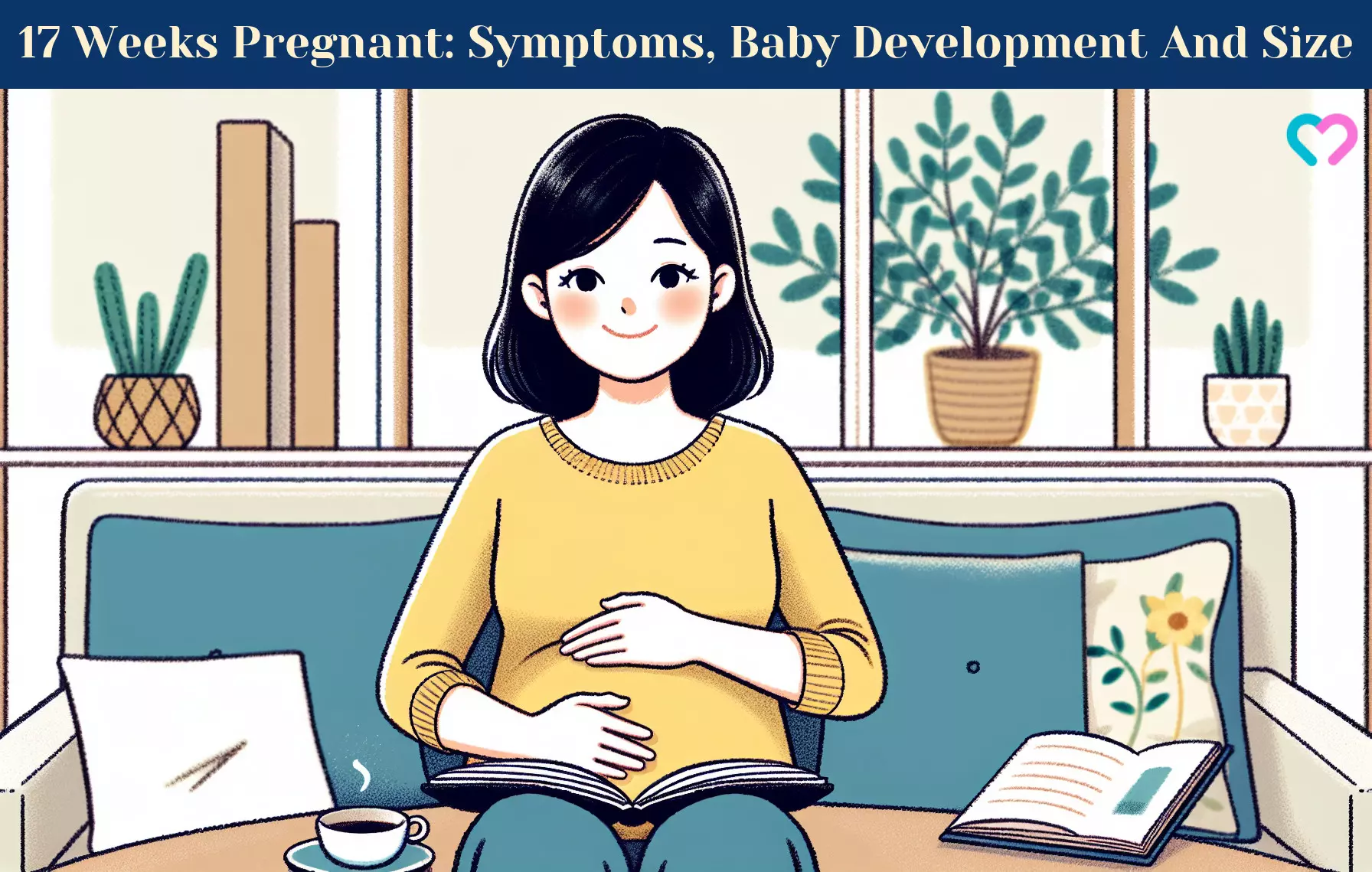
Image: Dall·E/MomJunction Design Team
Are you curious to follow the amazing development of your baby at 17 weeks pregnant? See how your little one is growing with this detailed video.
Personal Experience: Source
MomJunction articles include first-hand experiences to provide you with better insights through real-life narratives. Here are the sources of personal accounts referenced in this article.
i. My pregnancy @ 17 weeks + belly shot
https://www.youtube.com/watch?v=pnfDC3D3pTo
References
- Week-by-week guide to pregnancy.
https://www.nhs.uk/start-for-life/pregnancy/week-by-week-guide-to-pregnancy/2nd-trimester/week-17/ - 17 weeks pregnant.
https://raisingchildren.net.au/pregnancy/week-by-week/second-trimester/17-weeks - Charmaine Wright et al.; (2014); Who develops carpal tunnel syndrome during pregnancy: An analysis of obesity, gestational weight gain, and parity.
https://pubmed.ncbi.nlm.nih.gov/27512430/ - Is It Safe To Go To the Dentist During Pregnancy?
https://www.mouthhealthy.org/life-stages/pregnancy/pregnancy-dental-concerns - Itching during pregnancy.
https://www.pregnancybirthbaby.org.au/itching-during-pregnancy - Sumit Kar et al.; (2012); Pregnancy and Skin.
https://www.ncbi.nlm.nih.gov/pmc/articles/PMC3444563/ - Prenatal Genetic Testing.
https://mydoctor.kaiserpermanente.org/ncal/video/prenatal-genetic-testing-1600387 - Common Tests During Pregnancy.
https://www.hopkinsmedicine.org/health/wellness-and-prevention/common-tests-during-pregnancy - Claire Jones et al.; (2011); Sex in pregnancy.
https://www.ncbi.nlm.nih.gov/pmc/articles/PMC3080531/ - Pregnancy at week 17.
https://www.pregnancybirthbaby.org.au/pregnancy-at-week-17 - Understanding Second Trimester Miscarriage.
https://health.ucdavis.edu/obgyn/services/family-planning/trimester_loss - Travel and pregnancy.
https://www.pregnancybirthbaby.org.au/travel-and-pregnancy - 17 weeks pregnant.
https://raisingchildren.net.au/pregnancy/week-by-week/second-trimester/17-weeks
Community Experiences
Join the conversation and become a part of our nurturing community! Share your stories, experiences, and insights to connect with fellow parents.
Read full bio of Dr. Swati Chitnis
Read full bio of Sakshi Mishra
Read full bio of Rebecca Malachi
Read full bio of Aneesha Amonz






